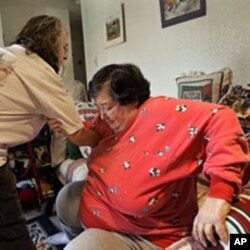The United States doubles as one of the best places in the world for career women looking to excel in male-dominated jobs, but one of the more difficult industrialized countries for working mothers.
In becoming a successful financial consultant, Veronica Campbell had to make some tough choices. She said she could not have advanced this far in her career had she started out married with young children and frequent travel even made dating too difficult.
When she started working in the 1970s, Campbell found it was more difficult to compete for positions and succeed. When she was turned down for a position, she was told the woman who had the position before did not work out and that no other woman would be hired in her place.
Campbell said things have changed since then and women are no longer regarded as being less capable than men in her profession. Anti-discrimination laws have allowed women to enter any profession they like, and advance in the ranks.
But working mothers often experience a different situation. Lisa Maatz, Director of Public Policy and Government at the American Association of University Women (AAUW), said there are many people who still assume that the woman should be the one to stay home to look after kids and that a working mother "won't be as loyal an employee” or that “she'll take more time off, she won't be free to travel."
U.S. gender gap indicators
The University of California’s Joan C. Williams, Professor of Law and Director of the Center for Worklife Law, said working mothers face greater workplace discrimination than that directed against women in general. And when doing the same job as men, working mothers are sometimes forced to choose between work and family needs.
"It's very hard to combine motherhood with employment because there [are] so few work-family support [systems,]" said Arian Hegewisch of the Institute for Women's Policy Research. "And the assumption is that that's all up to you. It's a private choice to have children, and so you have to make the arrangements and there's no real support from society."
Mothers like Renee Lewis, CEO and President of the Maryland-based Pensare Group, which advises businesses, struggle to manage their work and family schedules.
“You end up with very strong and compelling competitive demands on time. You’re always having to choose, and admittedly, I end up choosing many personal things out of the day. I see that as a huge risk," Lewis said. "I didn’t sign up to be Superwoman/mom/wife.”
These roles frequently interchange, said Lewis, and often include creative solutions such as assigning her kids tasks to help her through the day.
“I’ve had to create a “call-out” plan so the kids know the order they call others to get a ride or some help under what circumstances,” Lewis explained. “The kids also schedule their own appointments with the orthodontist, for example, and put those dates on the calendar.”
Forty percent of all children live in single-parent households, the majority of which are headed by women who can have a tough time finding affordable childcare, said Hegewisch.
"You might lose your job because of that. You might not be able to find work that fits in around the time when you need to be with your kids," said Hegewisch. "And while men are increasingly doing more at home, Hegewisch said they typically work longer paid hours, whereas women do the majority of unpaid care work.
Both childcare and eldercare can interrupt a woman's career if she is unable to juggle her time between them, as Campbell found out. She said caring for her mother was "part of the reason ... for stepping out of the career that I was in."
"I was the senior manager at the time and decided that I really couldn’t afford to give my mother the amount of time that I knew that she needed and also give my career the amount of time that it needed," Campbell explained. "And so I stepped back and … started a separate career in independent consulting."
But recent studies show that women holding the same degree and the same job as male counterparts get less pay. Citing an AAUW study that compared the pay gap between male and female graduates holding the same degree and the same job, Maatz notes that "one year out of college, there's already a five percent gap." And the shortfall increases over time as retirement benefits and pay raises are taken into account to as much as 12 percent over a period of 10 years, according to the study.
Shannon Lynberg, an advocate with Empowered Women International, says some of the young women she talks to often tell her they feel ready for the job market with the best education when they graduate. But once they get a job, they feel they are not receiving proper compensation or being treated fairly.
Recent statistics show American women are less likely than men to drop out of school and more likely to pursue higher education. And both Hegewisch and Lynberg suggest that higher education affords women a chance to get better jobs and higher pay.
"If you start working as a young woman, in your teens maybe or your early 20s and you are consistently being paid under what you're worth and you're not getting into higher-paid jobs or not putting away money in your savings ...that really adds up over a lifetime," said Lynberg.
Less pay means lower benefits and a lower pension, which makes it hard for older women to make ends meet. Hegewisch said women typically have higher rates of poverty at all stages of their lives, and a lot of the poverty among older women is due to their having earned less when they were younger.
Women's earnings and the jobs they choose to work are closely linked. Their wages are likely to increase in the fields they dominate - financial services, healthcare, or education - and decrease where they are underrepresented, such as mining. Hegewisch said this is due in part to a stubborn gender division in some professions.
In states like North and South Dakota, she said there is "such occupational segregation in the labor market" that women are more likely to work in education, retail, the care industry, and men are more likely to work in mining, forestry and manufacturing.
But when men working in manufacturing and construction began to lose their jobs at the beginning of the recent economic recession, many women become the primary breadwinners. And what that meant, said Maatz, is that the woman, "who was being paid less than the man to start with, became "the primary breadwinner and not ... bringing home enough bacon ... to pay the bills and feed the kids."
Despite the fact that women constitute up to 52 percent of the nation's population and are more likely to vote than men, they claim less than 17 percent of congressional seats and have lost 80 seats in state legislatures in the past year.
"For the first time in 30 years, the number of women in Congress has declined," said Lynberg. "And so I think it's really important that we have ... more political representation, more women, and especially more young women interested in the political process."
AAUW's Maatz said it is crucial to have women at the table because they care about different issues and pay attention to family in a way that is different from men. She said studies have shown that women lawmakers are more likely to introduce legislation, debate issues and "contribute to the process in a way that was markedly different from their male counterparts."
"When you shortchange women, you shortchange their entire family. And AAUW has always said [that if] you want a good economic stimulus, start paying women equally and you will definitely see a change in terms of both economic issues and consumerism as well," said Maatz.
















